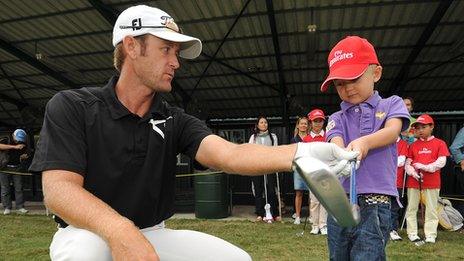Ryder Cup: The greatest moment as voted for by you
- Published
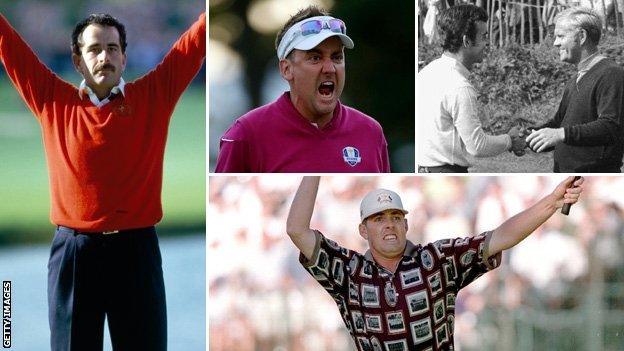
Tense, thrilling, fun, frenetic, sometimes controversial, always absorbing, the Ryder Cup throws up some of sport's most iconic and enduring memories.
The biennial tussle between Europe and the USA has a back catalogue of classic moments and BBC Sport selected 10 of the greatest.
Ahead of next week's contest at Gleneagles, we asked you to choose the best from our shortlist.
Find out how you voted below and click here to listen to the BBC Radio 5 live debate.
1st (47%) - Poulter's five straight birdies provide spark for Europe's "Miracle at Medinah" - 2012
The scene: Holders Europe, containing four of the top five players in the world, were heading for the kind of defeat they had not experienced for more than 30 years.
2012: Poulter sparks Miracle at Medinah
At 10-4 down on Saturday afternoon, they were at least boosted by a one-hole win for Sergio Garcia and Luke Donald over Tiger Woods and Steve Stricker. However, Ian Poulter and Rory McIlroy were two down on Jason Dufner and Dustin Johnson with six to play.
The moment: Not so much one moment but five of them as Poulter, a European talisman with 10 victories in his previous 13 matches, hit the hottest of putting streaks.
In birdieing each of the final five holes, Poulter charged to a one-hole win, sealing victory with a nerveless 10-footer in the gloom of the 18th.
His wide-eyed, fist-pumping roar was a sign of visiting defiance. "We have a pulse," he later told his team-mates. What followed was the greatest European comeback in the history of the Cup.
Eight-and-a-half points taken from the singles might have been the Miracle of Medinah, but Europe would have been too far back had it not been for Poulter's heroics.
Poulter: "You know what, these might be my majors. If they are, that's fine. If this is it, I'm a happy man. I've got more pride and passion to give in the Ryder Cup than I feel to win a major."
2nd (22%) - Clarke's emotional reception on the first tee following the death of his wife - 2006
The scene: Europe not only defended the Cup in 2004, but handed out an 18½-9½ thrashing at Oakland Hills. That, though, seemed irrelevant in the build-up to 2006 at the K Club in Ireland.
2006: Clarke gets emotional reception at the K Club
Darren Clarke's wife Heather died of cancer shortly after that year's Open, with Clarke subsequently halting all his playing commitments.
Clarke would need a wildcard selection from captain Ian Woosnam and, when it was offered, Clarke accepted in accordance with the dying wish of his wife., external
The moment: Clarke was partnered with Lee Westwood in the final fourball match on a crisp, clear first morning in Dublin. As the pair left the putting green, Westwood went on ahead to "work the crowd" and when the Northern Irishman strode into the arena around the first tee he was hit with what he later described as a "tsunami of noise".
With lumps in every throat, and Westwood and Clarke's caddie Billy Foster in tears, Clarke belted a 300-yard drive down the middle and birdied the first.
The Europeans beat Phil Mickelson and Chris DiMarco one up, and Clarke went on to win the other two matches he played, as Europe recorded another 18½-9½ win.
Clarke: "When Woosie dedicated the Ryder Cup to Heather, I doubt there was a dry eye in the house. Heather had wanted me to play and I'd done my bit. I knew she would have been proud."
3rd (11%) - The Concession. Nicklaus offers Jacklin a half to tie the match - 1969
The scene: Great Britain had won only three times in 42 years and were thrashed in 1967.
1969: Jack Nicklaus concedes to Tony Jacklin
But in perhaps the closest Ryder Cup in history,, external 17 of the 32 matches at Royal Birkdale went to the final hole. With only one pair left on the course, the contest was level at 15½-15½.
The moment: The Cup came down to the final match between America's then seven-time major winner Jack Nicklaus and 25-year-old Englishman Tony Jacklin, that year's Open Champion.
After Jacklin eagled the 17th, the match was all-square going down the last, with both men on the green in two. When Nicklaus holed a five-footer, Jacklin had two feet for a half and a share of the Cup - Great Britain's best result for 12 years.
But rather than asking Jacklin to putt, Nicklaus sportingly picked up his marker, halving the match and tieing the Ryder Cup for the first time.
Nicklaus: "I felt like the US was going to retain the Cup either way. I didn't think it was in the spirit of the game to make Jacklin have a chance to miss a two-footer to lose the match in front of his fans."
The Ryder roots |
|---|
A seed-seller named Samuel Ryder was in the crowd for the second of two unofficial matches between Great Britain and the United States in 1926 and donated money - and a gold cup - as GB travelled to Massachusetts for the first official match in 1927. |
4th (9%) - Champagne time. Torrance seals first win for Europe and USA's first defeat since 1957 - 1985
The scene: Following that historic Great Britain win at Lindrick, Yorkshire, in 1957, the US arrived at the Belfry unbeaten in 28 years. The Great Britain and Ireland team had been expanded to Europe in 1979, but despite two more heavy defeats, the tide was turning. In 1983, Tony Jacklin's side had come within a point of victory., external
Classic Ryder Cup: Sam Torrance seals first win in 28 years in 1985
The moment: With Jacklin back in charge, Europe held a 9-7 lead going into the Sunday singles in 1985. The tactic of loading the middle of his order worked and, by the seventh match, Sam Torrance could win the Cup with victory over Andy North.
Finding the 18th green in two, Torrance needed only one of the three putts he was afforded from 18 feet and the Cup was finally in European hands., external Jacklin drank Champagne on the green and was lifted on to Torrance's shoulders on the clubhouse roof to the delight of the singing crowd.
Torrance: "We partied through the night and, in fact, for the next four days. I was meant to go home to London the day after the match but instead we drank six bottles of champagne and ended up partying for three more nights."
5th (3%) - Olazabal's jig of delight as Europe win in the USA for the first time - 1987
The scene: Europe winning for the first time in 28 years was one thing, but the US had never been beaten on home soil. Their quest to regain the Cup was led by Jack Nicklaus, in his home state of Ohio, on the Muirfield Village course he designed.
The moment: A stunning opening two days - including winning all of Friday afternoon's fourballs - gave Europe a 10½-5½ lead ahead of the singles.
1987: Europe claim first win in US
The US fought back - five wins from the opening seven matches - but victory for Eamonn Darcy over Ben Crenshaw and Bernhard Langer's half with Larry Nelson left the stage clear for Seve Ballesteros.
The Spaniard's 2&1 win over Curtis Strange saw the first victory in America completed with a tearful Jacklin proclaiming it to be "the best week of his life".
In Nick Faldo's words, "that was when the Ryder Cup got serious", but the abiding memory is of Jose Maria Olazabal, after his debut in the event, dancing across the 18th green., external
Olazabal: "Whenever I see it I feel more embarrassed, ashamed even, than the time before. But I was young, it was my debut and I was so happy that my emotions took over."
On the trophy |
|---|
The figure on top of the Ryder Cup trophy is Abe Mitchell, who Samuel Ryder employed as his personal golf teacher. Mitchell was supposed to lead Great Britain in 1927, but was struck down by appendicitis. He did play in 1929, 1931 and 1933. |
6th (2%) - McDowell birdies the 16th to set up Europe's win at Celtic Manor - 2010
The scene: Celtic Manor was battered with rain as Europe attempted to regain the Cup surrendered at Valhalla two years earlier.
McDowell seals win for Europe in 2010
The weekend weather ensured that, for the first time, the Ryder Cup would be completed on a Monday. Europe began the day with a 9½-6½ lead.
The moment: As the Americans staged a day-long fightback, it became clear that the fate of the Cup would rest on the final singles match between Hunter Mahan and Northern Ireland's Graeme McDowell.
Amidst a huge crowd, and in front of millions on TV, McDowell holed a 15ft birdie putt on the 16th to go two up with two to play.
When Mahan duffed a chip from the edge of the 17th green and missed the following putt, the Cup was Europe's again.
McDowell: "Sixteen was massive, wow. It was the best putt I've hit in my life. The US Open [McDowell won earlier that year] felt like a back nine with my dad back at Portrush compared to that."
7th (2%) - Faldo fights back against Strange as Europe clinch victory at Oak Hill - 1995
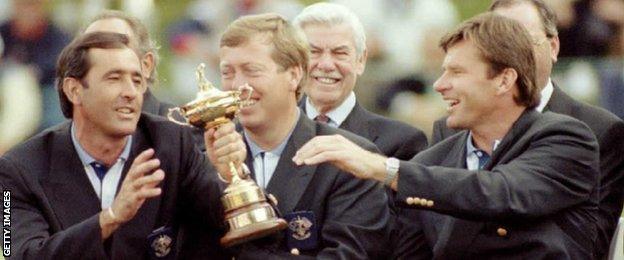
Nick Faldo (right) came from one down with two to play to win a crucial point
The scene: After losing at home in 1993, Europe were chasing a second away win in what would be the last of Bernard Gallacher's three Cups as captain and Seve Ballesteros's eighth and final match as a player.
1995: Faldo fires Europe to victory at Oak Hill
Trailing 9-7 at the beginning of the singles, an ageing Europe team would have to overcome a final-day deficit for the first time if they were to win the Cup, all on an Oak Hill course tailored for the hosts.
The moment: The Cup was hanging in the balance, and Nick Faldo's match with Curtis Strange looked pivotal. But the Englishman was one down with two to play.
As Strange bogeyed the last three holes, Faldo needed to get down in two from 94 yards to win on the last. He hit a wedge to within five feet, holed the put and took the point. When Philip Walton beat Jay Haas on the 18th, the Ryder Cup was Europe's once more., external
Faldo: "It was the best scrambling par I ever made. Everything was churning inside me as I came down the stretch and when I stood over that wedge shot I had to fight to keep my legs still. I knew how important it was and I was questioning myself: 'Can I still do it?'."
Cup of plenty |
|---|
Ten of the last 15 Ryder Cups have been decided by a margin of two points or less. Of those, one match (1989) was tied, while seven were won by a single point. |
8th (2%) - McGinley the unlikely hero as Europe win back the Cup at the Belfry - 2002
The scene: Europe had to wait three years for the chance to regain the Ryder Cup because of the 9/11 terrorist attacks of 2001.
When the US did arrive at the Belfry, they were faced with a European team led by Sam Torrance, the vice-captain left so angry three years earlier.
The moment: With the match locked at 8-8, Torrance front-loaded his singles order and saw his team claim four and a half of the first six points.
2002: McGinley the hero as Europe regain the Cup
With unsung Welshman Phillip Price pulling off a 3&2 win over Phil Mickelson, Irish rookie Paul McGinley had a 10-foot putt on the 18th for the half with Jim Furyk that would seal the Ryder Cup.
When the ball dropped, McGinley bounced up and down before being mobbed by his team and a tearful Torrance. To celebrate, McGinley jumped in the green-side lake and his soaking-wet pose with the Irish tricolour provided the Ryder Cup with one of its most enduring images.
McGinley: "As it went in the hole, I put my arms in the air and wondered 'why isn't anyone jumping on top of me?' I thought 'maybe it's lipped out?' I saw Sergio Garcia jumping up and down, then they came on. But, in real time, it was only one second. For me, time stood still."
9th (1%) - Leonard's monster putt sparks premature 'green invasion' at the "Battle of Brookline" - 1999
The scene: Europe faced a hostile atmosphere before they defended the Cup in Brookline - Jeff Maggert said that the US "had the best 12 players in the world", external - and that continued when the matches began.
1999: Leonard's putt sparks controversy at Brookline
Heckling and abuse towards the Europeans was common from the home fans, but the Americans still trailed 10-6 going into the singles.
The moment: Following a morning speech from future president George W Bush, the US roared back, winning all six of the opening singles.
Jose Maria Olazabal had a four-hole lead over Justin Leonard with seven to play, but, by the 17th, the match was all-square with the US needing only a half to regain the Cup.
From over 40 feet, Leonard sank a remarkable putt, which many of the US team believed had sealed victory. Players, caddies and even some spectators invaded the green to celebrate.
Olazabal, though, still had his 25-foot putt for a half and the Spaniard was forced to wait for the area to be cleared.
Ultimately, the match was halved to give victory to the Americans, but the home side were heavily criticised for the events on the 17th green.
European vice-captain Sam Torrance: "It's about the most disgusting thing I've seen in my life."
US player Davis Love III: "We didn't cry when we lost two in a row. And how long have they been calling our wives 'flight attendants' and 'bimbos'? They act like we're the only ones who do it."
Ryder roles reversed |
|---|
Of the first 25 Ryder Cup matches between 1927 and 1983, the United States lost only three times. Ireland were added to the Great Britain team in 1973, with the rest of Europe joining in 1979. Since 1985, the US have won on only four occasions. |
10th (1%) - Langer's putt slips by on the final green as the USA win the "War on the Shore" - 1991
The scene: In the year of the first Gulf War, US captain Dave Stockton played on patriotism at Kiawah Island - Corey Pavin wore a Desert Storm cap - and tempers were frayed throughout.
1991: Langer loses to Irwin at Kiawah Island
Ballesteros and Olazabal clashed with Paul Azinger and Chip Beck over an alleged ball change, while Stockton caused controversy by retaining the injured Steve Pate in his team, then withdrawing Pate from the singles, meaning his match with David Gilford was halved.
The moment: Amidst all the bad blood, the Cup would be decided by the final singles match between Hale Irwin and Bernhard Langer, who was two down with four to play.
When Irwin three-putted the 17th, Langer drew level to silence the huge gallery, but his second to the 18th found the edge of a bunker, only for a putt from off the green to leave the German with a six-footer to retain the Cup.
In barely believable tension, Langer's putt slipped by the right of the hole, Irwin had a half and the United States won the Ryder Cup for the first time in eight years., external
Langer: "Everybody remembers the six-foot putt I missed on the last, and rightly so, but I was also two down with four to go. If I'd missed any of the earlier putts, I wouldn't even have played 18. There's a lot more to it. Every point, every half-point, counts equally, whether it's in the morning or the afternoon."
Scotland's second |
|---|
The 2014 Ryder Cup at Gleneagles marks only the second occasion that the matches have been played in Scotland. In 1973 at Muirfield, Europe were yet to join. England has hosted the Cup on 15 occasions, but not since 2002. |
- Published22 September 2014
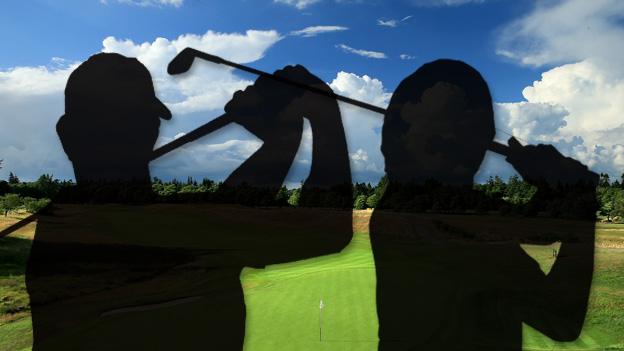
- Published23 September 2014
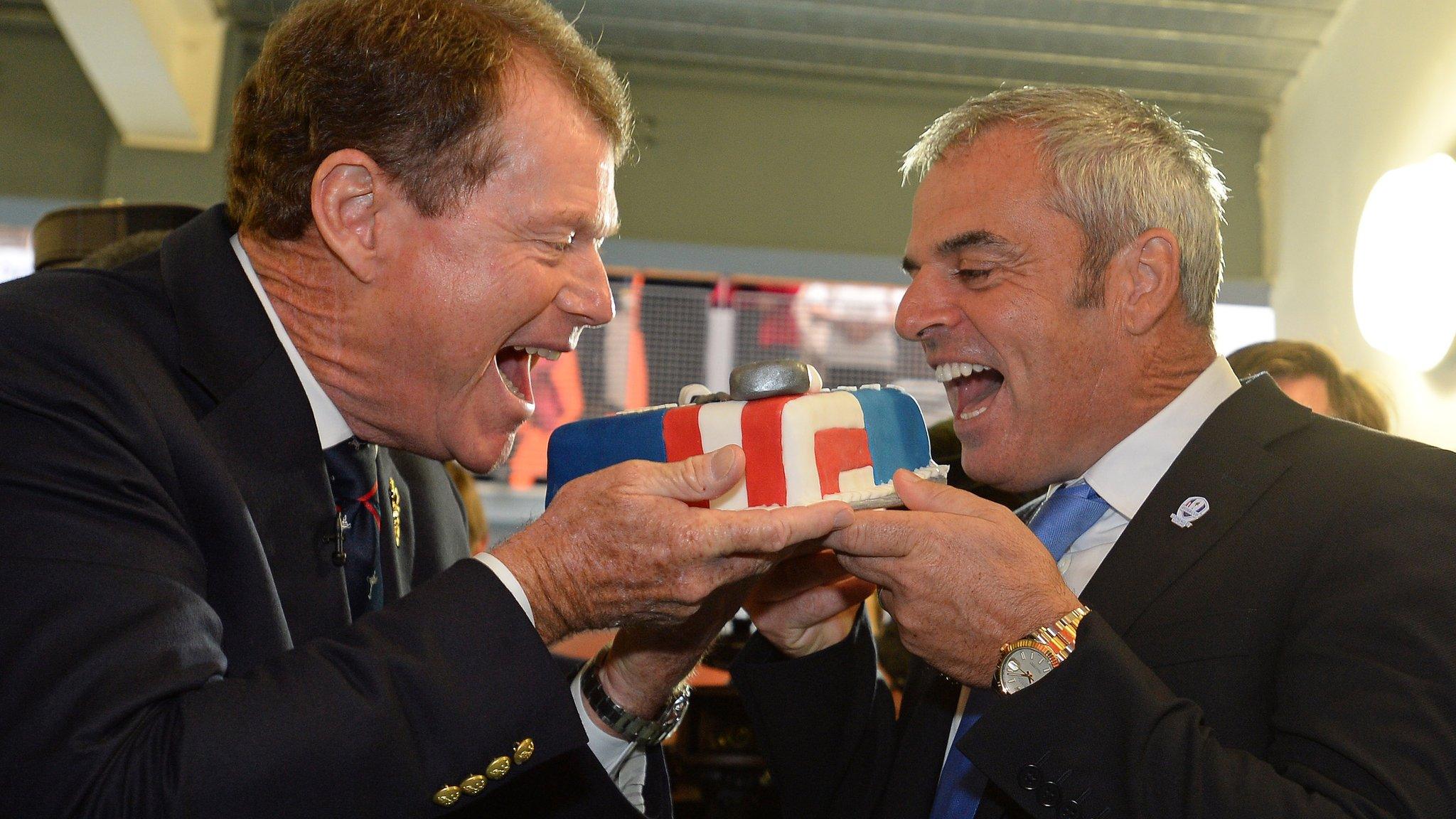
- Published2 September 2014
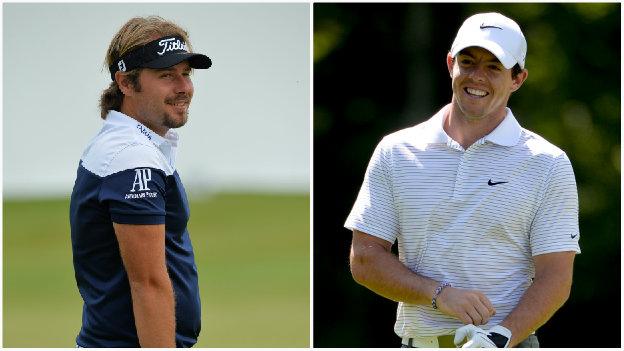
- Published3 September 2014
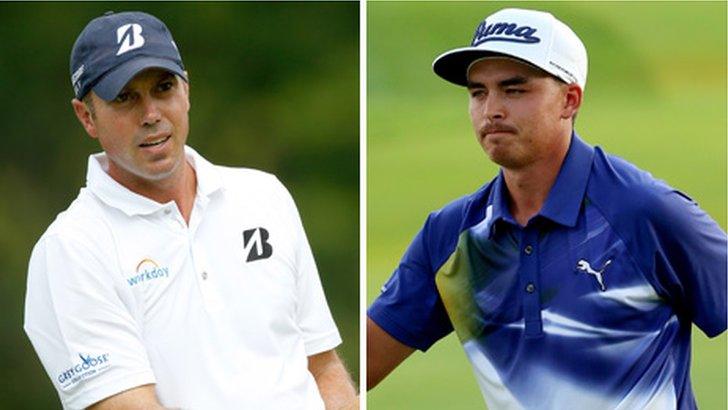
- Published2 October 2016
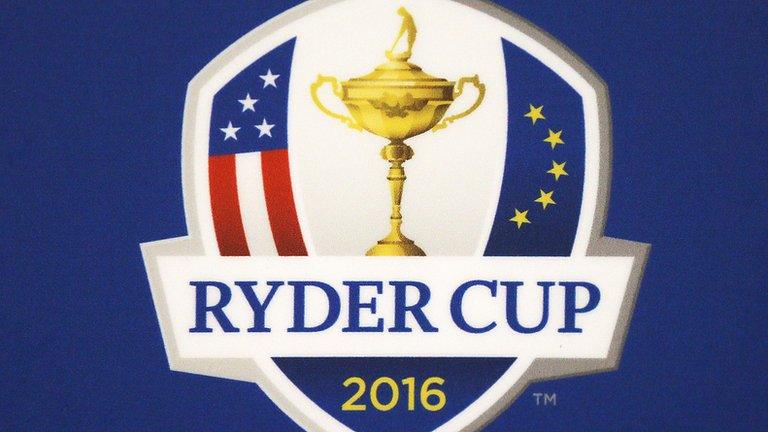
- Published28 September 2018
